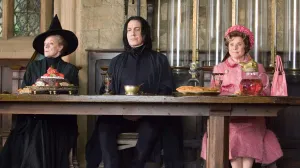“Brutal.” “Heartbreaking.” “Difficult.” “Complex.” Those are just a few of the words critics are using to describe HBO’s The Last of Us season 2, which had its review embargo lifted on Monday to mostly positive reception. Based on the divisive video game The Last of Us Part II — which fared better with reviewers than fans — the long-awaited second season is being hailed by some as “the best game adaptation ever made” and “a mixed bag” by others.
Videos by ComicBook.com
On review aggregator Rotten Tomatoes, season 2 of The Last of Us debuted with a 93% “certified fresh” (just a notch below the first season’s 94%). On Metacritic, it averaged a score of 82 (indicating “universal acclaim”). Critics screened the entire season.
RELATED: The Last of Us Season 2: Premiere Date, Time & Where to Watch (And How to Catch Up on Season 1)
“The Last of Us season 2 is bigger, better, and bolder than season 1,” Cade Onder wrote in ComicBook’s 4 (out of 5) star review. With a note that some changes from the game might spark fan fury, he added, “It’s brutally raw, vulnerable, and it will likely drive viewers to tears every other episode, thanks to the powerhouse performances from Bella Ramsey and Pedro Pascal.”
The seven-episode second season takes place five years after the events of the first season, which ended with Joel (Pascal) and Ellie (Ramsey) settling in Jackson, Wyoming. When their collective past catches up to them, the logline states, “Joel and Ellie are drawn into conflict with each other and a world even more dangerous and unpredictable than the one they left behind.”
See some more excerpts from early reviews below:
TV Guide: “[Showrunner Craig Mazin] has likened this season to The Empire Strikes Back, as both tell stories in which wins turn into losses and characters lose their way. Season 2 is in many respects a tougher and more upsetting season than the first. The cast, especially Pascal and Ramsey, does superb work, but what made Joel and Ellie easy to like and root for in the first season starts to erode here, another consequence of Joel’s actions in Salt Lake City. That makes Season 2 more difficult but also more complex and provocative. The Last of Us began by dropping characters in the middle of a nightmare. In its continuation, they have to deal with the realization that part of that nightmare is their own creation.”
RogerEbert.com: “Anyone who has played the games on which HBO’s The Last of Us is based knows that things are about to get intense. Without spoiling a single thing, the video game The Last of Us Part II turns up the volume on the first game’s themes of individual responsibility set against the greater good with blood and trauma. Creators Craig Mazin and Neil Druckmann have not watered down any of the game’s violent intensity for their 7-episode sophomore season, delivering a show that they’ve accurately compared to The Empire Strikes Back in both its bleak tone and how it sets up a third outing. The first season had the privilege of telling the self-contained story of the first game. But Druckmann and company knew they couldn’t get all of Part II into one season, a decision that could lead some to call this year incomplete. While artistically satisfying in its own right, trust that it’s all setup for what’s to come in season three (and possibly beyond).”
Empire: “It would be so easy for a show like this to feel unremittingly bleak, to embrace a kind of televisual nihilism. Be in no doubt, there will be tears (and more are bound to come in Season 3). But the magic trick the showrunners have waved here is in finding a delicate balance of tones, in finding warmth that melts the literal and figurative ice. The storytelling here is thoughtful and elliptical. One episode serves as a flashback, catching us up on intervening years between seasons, perfectly recreating the game’s most profound moments. It is astonishing, the sense of innocence and wonder that Ellie briefly enjoys in this episode, a bittersweet pill of the safety she has finally found, and the tragedy we know is yet to come.”
Time: “Season 2 feels insubstantial in other ways, too. Probably because its seven episodes constitute only a partial adaptation of The Last of Us Part II, whereas the nine-part first season covered the entire original game, the story is stretched too thin. Development of apparently crucial new characters like Abby and Isaac is minimal. While Season 1 had a few dazzling standalone episodes that broadened and deepened the show’s world, this follow up is oddly workmanlike; one flashback episode plays like a pale imitation of those highlights. And the finale is so abrupt and unsatisfying, it took me a while to realize it was the finale. In that sense, The Last of Us’s sophomore outing reminds me of Squid Game’s glacially paced second season, which ends just as the action is ramping up, in what comes off as a ploy to mine an international smash for maximum content. Both shows are in danger of becoming victims of their own success.”
Rolling Stone: “Ramsey is still riveting playing Ellie as an open wound, and Pascal still has some lovely moments as Joel struggles to reconnect with Ellie. And when the series wants to pump up the spectacle, it does it with a level of scale and execution that at times rivals Game of Thrones. But there are also some odd issues with pacing and point of view. The season ends on a frustrating note. And whenever we get a glimpse of, or reference to, Ellie and Joel hanging out in better times, it’s hard not to wish that the show was still primarily about the two of them, rather than all these other people and problems … Mostly, though, it’s the lack of Ellie and Joel that keeps the season, while still strong overall, from hitting the heights of that first year.”
The Hollywood Reporter: “There’s mysterious, and there’s incomplete. By the time the season two finale has Ellie chasing after one group of people we don’t really know, whose motives and goals remain opaque to us, only to get waylaid by a different group of people we don’t really know, whose motives and goals remain opaque to us, HBO’s hit video game adaptation has fully tilted into the latter. Its lasting impression is one of anticlimax, as it becomes apparent that the answer to most of the questions it raises is: ‘You’ll see next season.’ … But I did find myself missing the rich lyricism of that previous chapter, the sprawling humanity of it, the devastating finality of it. Maybe all of that, too, is being saved for season three.”
Gizmodo: “It does an incredible job telling a strong, albeit slightly abridged, story while simultaneously teeing up a potentially even better story. However, it’s done so subtly that it’s almost hard to fully appreciate it as it’s happening. But, as it’s happening, it’s still very clear it’s a season that more than lives up to the very high expectations.”
IGN: “It was always going to be a challenge to adapt The Last of Us Part 2’s sprawling, twisting story into a television show across multiple seasons, and at the halfway point, the jury is still out on whether it will ultimately work. Season 2 of HBO’s Naughty Dog adaptation is not bad television, far from it. It’s incredibly well-made, often looks gorgeous, and is packed full of stellar performances. But the storytelling devices and choices made in terms of pace and placement for key events bump up against what works, ultimately not delivering the striking effect this story’s undeniable shocking events should. It’s good, just not a patch on its stellar source material (or its first season) so far.”
Toisto: “As an adaptation, season 2 of The Last of Us improves upon its source material in every conceivable way. In place of immediate control, it gives us emotional interactivity, which proves a far better companion to the horrors ahead. We no longer have to consider our part in the action through limited gameplay. Instead, our part is to ask how we would react to the dilemmas presented in this tragedy. The resulting series provides a richer, more nuanced conversation on the nature of violence, protection, and the societal contract. It is the best game adaptation ever made, and then some.”
IndieWire: “If Season 2 feels less complete than Season 1, it’s not for lack of substance. (Though less bloated, it’s similar to Squid Game 2 — more of a drummed-up half-season than a complete arc of its own.) There’s less clicker combat, too, although the provided set pieces are still spectacular and their clashes still staggering. In addition to [Catherine] O’Hara’s thorny, well-honed performance, Pascal’s aching stares and Ramsey’s innocent glimmer are deployed to perfection and developed as scrupulously as the scripts. The Last of Us remains a rush to watch, as overwhelming as a tidal wave and piercing as the coldest water.”
The Last of Us season 2 — which stars Pedro Pascal as Joel, Bella Ramsey as Ellie, Gabriel Luna as Tommy, Rutina Wesley as Maria, with Kaitlyn Dever as Abby, Isabela Merced as Dina, Jeffrey Wright as Isaac, and Catherine O’Hara as Gail — premieres Sunday, April 13 on HBO and Max.








